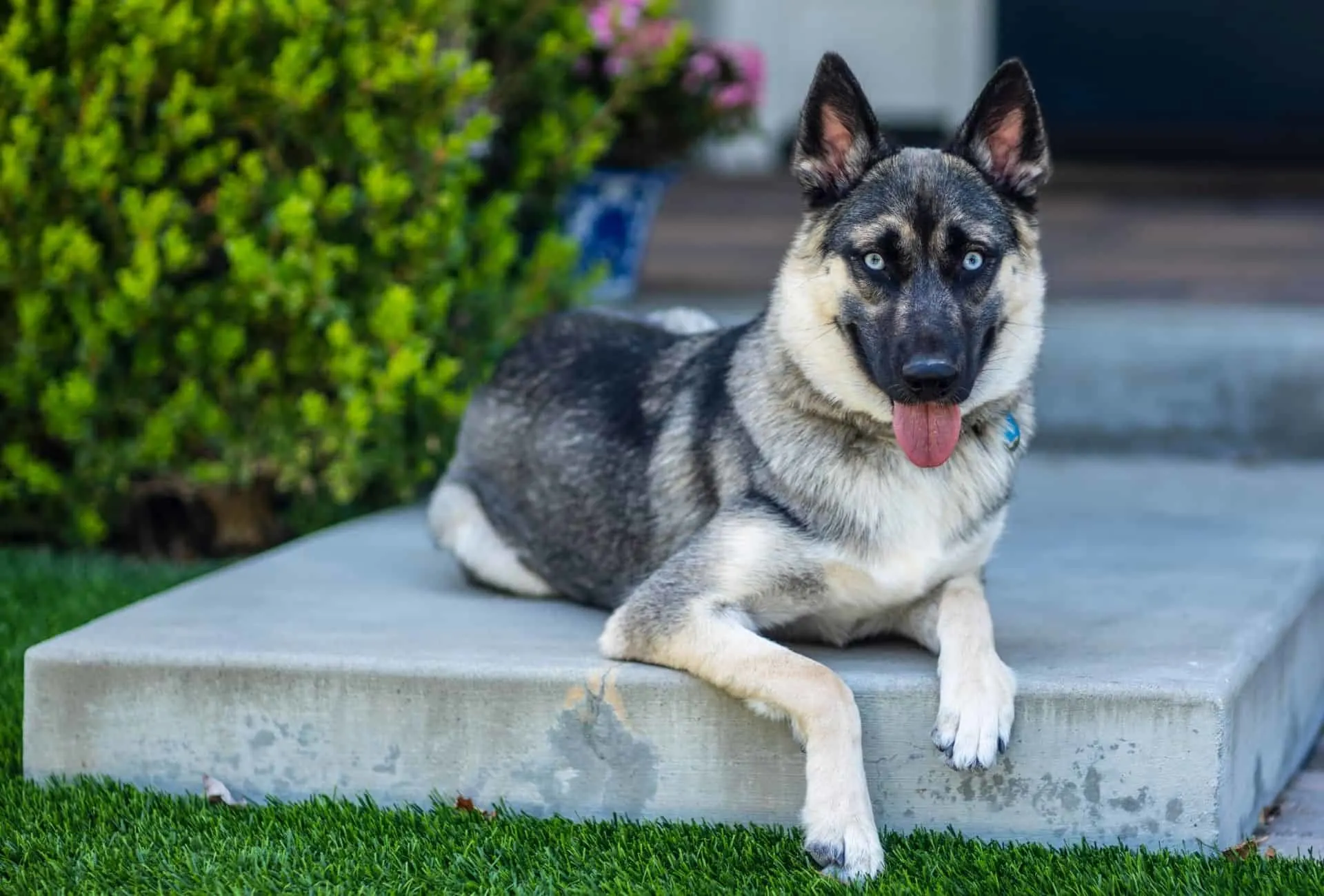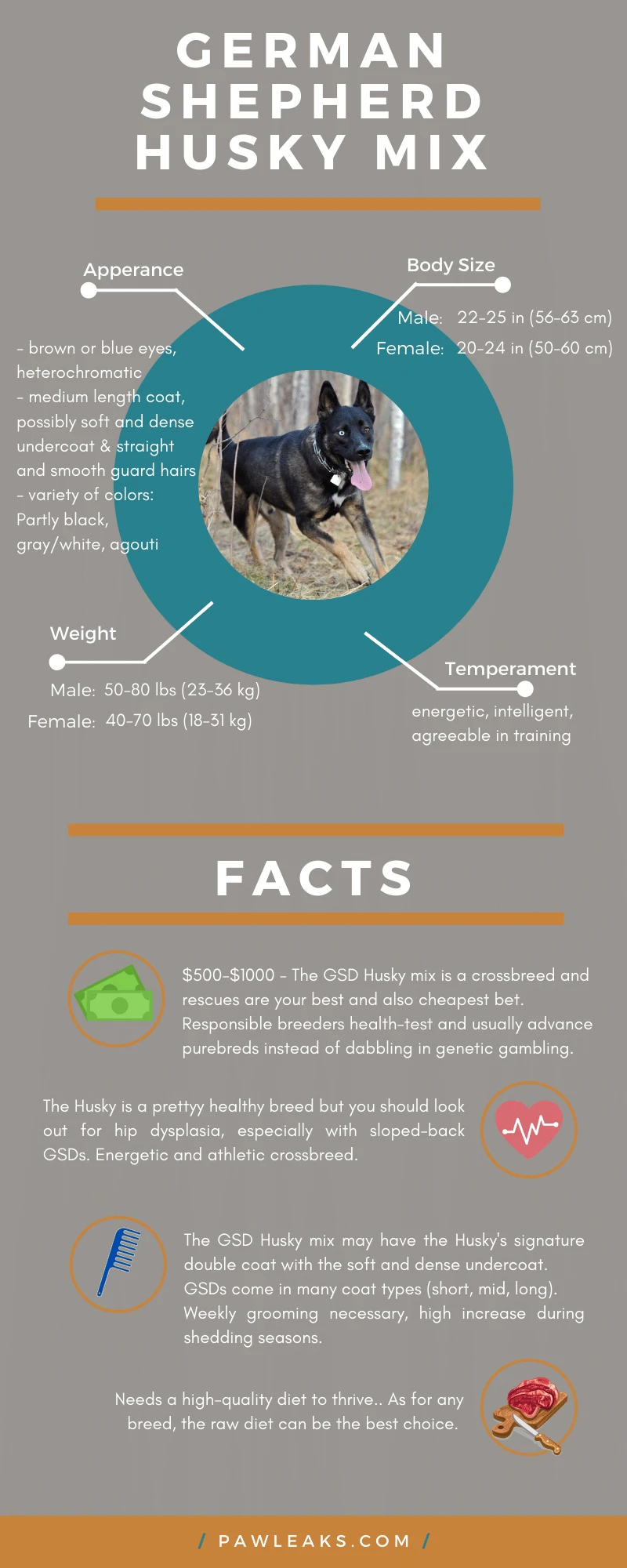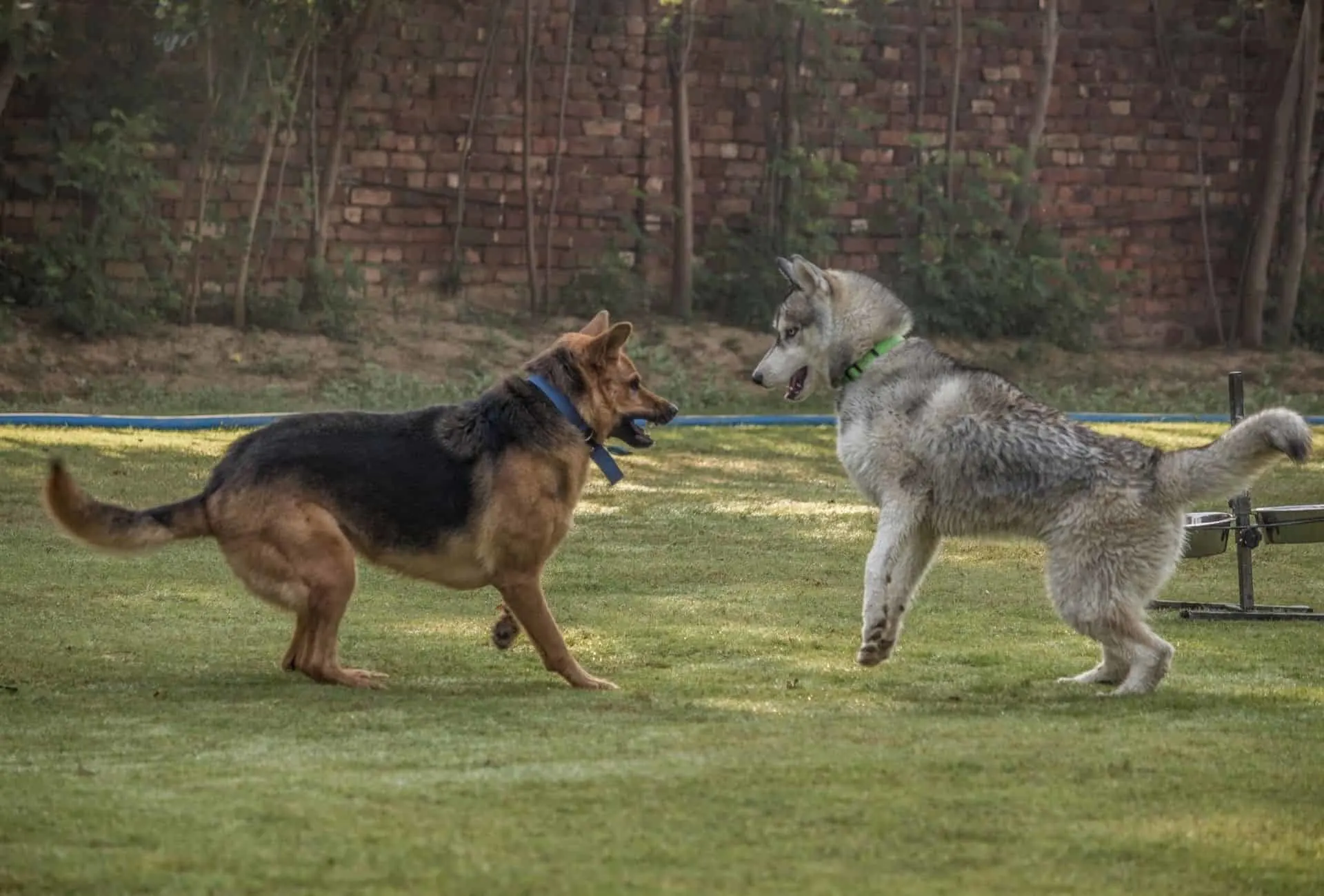Does the German Shepherd Husky Mix or Shepsky have the potential to be your next dog?
The thought behind crossing these breeds may spring from good intentions, but I’ll dive deeper into the pros and cons of such a mix.
As the name suggests, the German Shepherd originates from Germany and is a breed that is deeply interwoven with German culture.
Its popularity has spread worldwide which is not a surprise considering their desirable traits and talents.
The Siberian Husky is a favorite all around the world, whether as a sled dog or as a fluffy companion.
Their thick double coat developed over the course of hundreds of years while facing the sub-zero temperatures in Siberia.
There definitely are a couple of things you have to think about before bringing a German Shepherd Husky mix puppy into your home.
The differences between these breeds range from temperament to how they behave with your family as well as trainability.
Furthermore, there’s absolutely no advantage to getting a crossbreed from a breeder.
Combining two breeds is genetic gambling and in my opinion, you’re better off buying either one of these breeds from a breeder who does health testing.
This post is for those wanting to inform themselves about the poor souls that are currently sitting in shelters because somebody thought it’d be awesome to have one of these designer dogs.
We’ll look into the following points:
- Trainability
- Exercise/Strengths
- Temperament
- Leadership
- Grooming/Coat
- How big German Shepherd Husky puppies get
- Apartment living
- Cost of German Shepherd Husky pup
- Diet
After reading this article, you’ll know exactly what the differences and similarities between these two breeds are.
I always like to drop a couple of thoughts before diving in to make sure you know what you’re getting into with mixed-breed puppies.
While getting a mixed breed is totally okay if you’re adopting rescues, it’s always hard to predict how any individual dog will turn out since they can definitely lean more into the direction of one or another breed.
Imagine a 50/50 split of desirable/undesirable behavioral traits from both breeds.
How could your dog turn out?
- Obedience and loyalty from the German Shepherd, independent thinking from the Husky
- Tendency to police and bark at other dogs as well as the jumpiness of a Husky in city life
- All the best traits from one breed and the bad from the other
Just keep in mind that your pup’s character cannot be predicted with mixed breeds.
A German Shepherd Husky mix is expected to live between 10-14 years, weigh around 40-80 pounds, and grow around 20-25 inches tall. The Shepsky is usually a high-energy mix.
| Lifespan | 10-14 years |
| Weight | 40-80 pounds (18-36 kg) |
| Height | 20-25 inches (50-63 cm) |
| Activity Level | High |
1. How To Train a German Shepherd Husky Mix
The German Shepherd is known to be very eager to please.
Why do you think the police force and military are using the German Shepherd so much?
Sure, a Doberman can do the job just fine and there are definitely dog breeds that have stronger olfactory senses or stronger bites but they may not be willing to obey every command in every situation.

They are too intelligent to outright obey everything which can sometimes be perceived as stubborn.
Does that mean the German Shepherd is not smart?
Absolutely not. In fact, the German Shepherd is often cited as one of the smartest dog breeds, right after their cousin the Belgian Shepherd, also known as Malinois.
It’s just that they’re just so eager to please that they don’t question commands. Their will to please outranks.
How trainable is the German Shepherd Husky mix? Well, the Husky is known to be quite independent by design.
It’s their job to make decisions in hazardous winter conditions and they’re pretty intelligent too.
So even though pairing these two very smart dog breeds makes sense at first glance, a Shepherd Husky mix might not be as easy to train as imagined.
That being said, pairing a German Shepherd with a more agreeable Husky can certainly help.
Genetics and temperament of the parents always play a pretty big role.
2. How To Exercise Your German Shepherd Husky Mix
The original purposes of the German Shepherd vastly differ from that of the Siberian Husky.
German Shepherds are true all-purpose workaholics most commonly found in the following sports:
- Tracking
- Schutzhund
- Police/military force
A lot of people get German Shepherd Husky mixes to retain that protective instinct that the German Shepherd has.
This is not always the case and even a purebred may struggle with protection without proper direction and training.
That doesn’t mean you should start protection training with your mixed breed or even purebred on your own.
Always consult a professional to avoid teaching your dog negative behavior patterns (barking at strangers on walks, lunging at dogs, and so on).
Let’s take a look at the Husky.
Huskies are incredibly enduring. How could they not, they were bred to run hundreds of miles in very cold climates.
But their original working purpose was quite specific and they may need to have an outlet for this desire to run.
A Husky German Shepherd mix may not be into snuffle mats or toys as much as you’d like him to but needs mental stimulation nonetheless.
Training your dog early on will prevent behavioral issues in the future and gets your dog used to brain training.
Since both breeds are relatively high energy, you need to walk your Shepsky at least twice a day for a minimum of 30-60 minutes each.
3. German Shepherd Husky Mix Temperament
Is the German Shepherd Husky good for families?
The German Shepherd is known to be a formidable family dog while the Husky can be quite reserved.

Huskies are used to living and working in a pack and can be very sociable animals while Shepherds develop a deep bond with their owners.
Although pairing these two breeds can produce great family dogs, there are other large dog breeds that are even suitable for apartment living out there that are very patient with children and also perfect for guarding property.
4. What Can I Expect From a German Shepherd Husky Mix?
Expect to have a very smart dog that will challenge you throughout the day.
He will probably grow into a medium to large-sized dog with a weight of about 40 to 80 pounds.
Both dogs are working breeds so you can expect a Shepsky to have high exercise needs.
A task or daily job would keep them the happiest.
5. Grooming
Both dog breeds can have relatively similar coat types.
Huskies have a thick double coat, meaning an undercoat plus guard hair.
While the undercoat is soft and dense, the guard hairs are straight and somewhat smooth.
Due to this double coat, they’re better off in cold climates while the German Shepherd comes in a long-haired and short-haired version.
Depending on the specific pairing, the coat can be a toin coss.
Be ready for shedding seasons with both of these dogs.
6. How Big Does a German Shepherd Husky Mix Get?
You can expect your male German Shepherd Husky mix to be 22-25 in (56-63 cm) with a weight of 50-80 lbs (23-36 kg).
Female German Shepherd Husky mixes range from 20-24 in (50-60 cm), weighing in at 40-70 lbs (18-31 kg).

The breed standard for the German Shepherd mentions the following:
Male – Height: 24-26 inches (60-65 cm) | Weight: 66-88 lbs (30-40 kg)
Female – Height: 22-24 in (55-60 cm) | Weight: 49-71 lbs (22-32kg)
And here are the regular sizes and weights for Huskies:
Male – Height: 21–23 1/2 in (53-60 cm) | Weight: 45-60 lbs (20-27 kg)
Female – Height: 20–22 in (50-56 cm) | Weight: 35-50 lbs (16-23 kg)
The difference between these two dog breeds is not huge.
7. Apartment Living
Can you live in an apartment with a high-energy dog like the German Shepherd Husky mix? It depends.
Although many people argue that large dog breeds need a big yard and house, that’s just not true.
If you provide your dog with an outlet for his exercise needs (which means lots of walks, play, and training) then there should be absolutely no problem.
However, their tendency for high-pitched barks or howling may cause problems with your neighbors.
Proper training will help and entails teaching your dog the quiet command.
An apartment is not meant to be a playground for your dog, it’s a place to unwind from outside activities.
If your environment doesn’t allow for sufficient exercise, a large property would be advisable.
8. How Much Do German Shepherd Husky Puppies Cost?
Mixed-breed dogs tend to be sold for less than purebred dogs, the price for a German Shepherd Husky mix is $500-$1,000 from a breeder and $100-$300 from shelters.
Would I advise you to buy a mixed breed from a breeder? Definitely not.
There are far too many mixed breeds sitting in shelters and waiting to be chosen.
If you do decide to go with a breeder nonetheless, make sure you’re in for a behavioral surprise and only buy from breeders that test their dogs for health.
As long as there are no health issues present in their ancestry, you could argue that mixed breeds might be healthier than purebreds from backyard breeders.
Beware of backyard breeders mixing in a third breed without stating so.
Also, I’d stay away from breeders that charge a premium for the popular two-colored eyes or whatever fancy feature is popular.
Make sure to check out my breeder questions before you fall victim to scammers or backyard breeders.
9. Perfect Diet For Your Husky German Shepherd Mix
Both dog breeds are relatively healthy if you buy from the right lines, but German Shepherd Husky mixes are known to suffer from hip issues.
Personally, I’d avoid the German Shepherds with the curved back and only go for straight-back German Shepherds.
Sloped-back German Shepherd Husky mixes might come with hip issues and it’s an unnecessary risk to take.
As far as diet goes, I’m a fan of the raw diet but any high-quality kibble or wet food with all the nutrients can work just fine. Make sure to talk to a veterinarian or nutritionist first.
Do you have a German Shepherd Husky mix? Share with us your experiences in the comments below!
Disclaimer: I’m opposed to deliberate cross-breeding. The resulting dog is a genetic gamble in terms of health and temperament and offers no advantage to a health-tested dog or rescuing.
Check out my article discussing the most relevant scientific study on this topic.
Disclaimer: This blog post does not substitute veterinary attention and does not intend to do so. I am not a veterinarian or pet nutritionist. If your dog shows any sign of illness, call your vet.
Marie
Sunday 13th of August 2023
I rescued Tucker, my Husky/ Shepherd mix, at 8 months old. He is now 2 and is amazing! I have no idea what happened for him to be found roaming the streets of Louisville Kentucky and picked up as a stray, but I am forever grateful he ended up in my rescue transport. He has the black and tan colors of a shepherd and the look of a husky and blessed with one blue and one brown eye. Tucker should've been named hunter, he's always hunting for something...squirrels, bunnies, moles underground, insects, you name it he will find it. The shedding is ridiculous lol but brushing and fish oil on his food has helped a ton. There's also a de shed conditioner our groomer uses 2 times a year that seems to help for a while. My suggestion on the breed...train train train and lots of mental stimulation. Games, walks, exploring new scents, learning new tricks, proper socialization when they're young. Lastly...you need to be the alfa in the pack. Best of luck to you all..
Stef
Saturday 22nd of July 2023
I’m struggling with our beautiful girl! She’s amazing and we rescued her(threats that she would be shot😡), she’s food oriented and we had 2 beautiful babies before her but she’s quite aggressive when it comes to food and toys.. I’ve recently lost one of my original best friend and rescued another! But today she had the new baby by the head, no provocation either wondering can we get over this, is she trainable or do I re-home her? I’d hate to lose her
Danielle
Monday 24th of July 2023
This sounds like a not-so-uncommon resource aggression issue. I'd recommend finding a trainer who specializes in aggression issues. Do not keep feeding them together or let toys lie around, it'll only lead to fights. If you're ready to commit to fixing it, you probably will not have to re-home her, but it's impossible to say without seeing the dog in person, that's why I'd recommend you find a responsible trainer with a track record.
Sabrina
Sunday 14th of May 2023
I have a 7 month old Shepsky and she does have a lot of energy but I have a large yard and a 1 year old Rottweiler blue healer that keeps her busy. I have to say, she is the sweetest thing, beautiful blue eyes and very smart! But I wouldn’t say she would be the best for little kids because she is very excitable and likes to jump which we are working on, also can be a little mouthy and use me as a chew toy in a loving way but could be a issue with little ones, but for the most part she is smart, knows basic commands and always happy! She would be a great breed for an active young adult. And I must say the best dogs I have ever had have been mixed breeds (or mutt) and usually the runt of the litter… I would NEVER GIVE HER UP OR MY ROTTIE MIX , they are both female and are the best of friends.
Chloé
Monday 10th of April 2023
And one more thing! GSD is an AMAZING athletic dog breed and a great running companion, isn't it?
Travis
Wednesday 1st of March 2023
My niece has a friend who's GS and husky had an accidental litter. They are 10 weeks old and he wants to give them away because they were unplanned and he is not a breeder. I have a small studio type house but have 10 acres of land. It's just my 10 year old daughter and I and we do a lot of camping. I'm at work 10 hours a day and she goes to school. I'm thinking about taking one of them as our Jack Russell had to be put down after 13 years but I'm not sure if this would be a good dog to be left at home that long alone. Also what about water do they like to swim and play in the water. I'm having a hard time deciding on this pup and going to a breeder and getting a Lab.
Danielle
Friday 3rd of March 2023
Hi Travis, first of all, accidental litters are the worst. It shouldn't happen but well, now that the puppies are there... hopefully they learn from it and prevent anything in the future.
Not sure what you mean by saying he wants to give them away at 10 weeks cause he's not a breeder. That's exactly what breeders do, they raise the puppies until 8-12 weeks and then they search for suitable homes for them. I hope he read about socialization, vaccines, proper diet, etc. for these pups. He needs to research how to find suitable homes.
Regarding your question: A dog cannot be left alone for 10 hours. You'd need to organize somebody who walks the dog and perhaps plays a bit with them, probably even twice during that time frame. Generally, dogs should not be left alone longer than 4 hours at a time.
Also, your dog will need a lot of house training in the beginning so it's usually recommended to take some time off, puppies aren't easy.
Whether they will like water differs from individual to individual. There are some breeds that tend to like water (Labs, Spaniels, etc.) but yours might or might not like it.